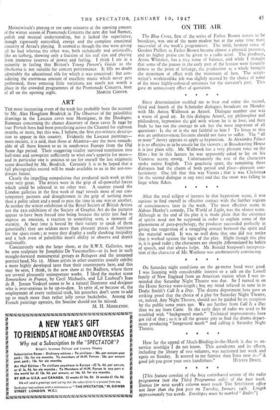ON THE AIR
The Blue Cross, first of the series of Father Brown stories to be broadcast, was one of the more modest but at the same time most successful of the week's programmes. The mild, hesitant voice of Gordon Phillott as Father Brown became almost a physical presence, and no higher praise can be given to a radio actor. The producer, Ayton Whitaker, has a nice sense of balance, and while I thought that some of the pauses in the early part of the feature were leisurely almost to the point of lethargy, the production as a whole brought the maximum of effect with the minimum of fuss. The script- writer's workmanlike job was slightly marred by the choice of some of the more highly-coloured sentences for the narrator's part. This gave an unnecessary effect of quotation.
Sheer determination enabled me to hear and enjoy the second, third and fourth of the Schnitzler dialogues broadcast on Monday with Mr. Anton Walbrook as Anatol. Dialogue number one was a waste of good air. In this dialogue Anatol, toy philosopher and philanderer, hypnotises the girl with whom he is in love, and then finds he has not the courage to ask her the most important of all questions : Is she or is she not faithful to him ? To listen to this was an embarrassment listeners should not have to suffer. The " all or none " theory appears to apply to hypnotism. At Alexandra Palace it is so effective as to be unsafe for the viewers ; at Broadcasting House it is just plain silly. Mr. Walbrook has a very pleasant voice on the films ; but in this feature he was apparently asked to lay on his Viennese accent strong. Unfortunately the rest of the characters spoke native English. This gaucherie apart, the remaining three dialogues had the charm of both period and place—pleasant con- fectionery. One felt that this was Vienna ; that it was Christmas (in the second dialogue at any rate) and that the snow was falling in large white flakes.
* * * *
After the total eclipse of interest in that hypnotism scene, it was curious to find oneself in effective contact with the further regions of consciousness later in the week. The most effective scene in Aldous Huxley's comedy, The World of Light, was the séance scene. Although at the end of the play it is made plain that the existence of spirits need not be supposed in order to explain some of the phenomena of para-psychology, the producer succeeded perfectly in giving the suggestion of a struggling contact between the spirit and the material world. It was so well done that one did not notice that it worked against the logic of the play. Slight though this play is, it is good radio ; the characters are sharply differentiated by habits of speech, and that always helps. Mr. Ronald Simpson's interpreta- tion of the character of Mr. Wenham was unobtrusively convincing.
On Saturday night conditions on the 49-metre band were good. I was listening with considerable interest to a talk on the Lowell family of New England from an American station when I was re- minded that Saturday Night Theatre was due. So I turned in on the Home Service wave-length ; but my mind refused to tune in to Dodie Smith's Call It a Day. The drama department here gave us striking proof that the choice of a play for Saturday Night Theatre, or, indeed, Any Night Theatre, should not be guided by its reception by the public some years ago. We are further from Call It a Day than we are from Caste. In the early days of radio we used to be troubled with " background mush." Technical improvements have got rid of that ; so it is all the greater pity to find the drama depart- ment producing " foreground mush " and calling it Saturday Night Theatre.
How far the appeal of Much-Binding-in-the-Marsh is duc to ex- service nostalgia I do not know. This aerodrome and its effects, including the library of two volumes, was auctioned last week and again on Sunday. It seemed to me funnier than Itma now is—" A good job you grow your own handlebars." HUNTER DIACK.
* *
[This feature consists of the best contributed review of the radio programme (not the Third Programme only) of the past week. Entries for next week's column must reach THE SPECTATOR office not later than the first post on Tuesday, 7anuary 14th. Length approximately loo words. Envelopes must be marked " Radio."'


































 Previous page
Previous page